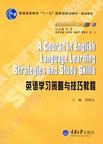英语学习策略与技巧教程
2004-10
重庆大学出版社
张维友
289
350000
无
进入21世纪,我国高等教育呈现出快速扩展的趋势。为适应社会、经济的快速发展,人才的问题已经提到一个比中国任何一个历史时期更加显著的位置。当今.人才的能力和素质的衡量越来越多地采用国际标准,人才的外语水平自然地越来越受到培养单位和用人单位的重视,由此引发了对大学外语教学、教学模式、教材和检测机制的新一轮讨论,掀起了新一轮的大学英语教学改革。作为外语师资队伍和外语专业人才培养的高等学校英语专业,相比之下,在教学改革思路、新教材开发和新教学模式探讨等诸方面均显得滞后。尽管高等学校外语专业教学指导委员会英语组针对当前高校发展的新形式和外语专业人才培养的新规格、新模式和新要求,修订出了新的《高等学校英语专业英语教学大纲》,并结合21世纪外语人才培养和需求的新形势,制定了由教育部高等教育司转发的《关于外语专业面向21世纪本科教育改革的若干意见》,就英语专业的建设提出了指导性的意见,但是在实际工作中这两个文件的精神尚未落实。 为此,重庆大学出版社和外语教学界的专家们就国内高等学校英语专业建设所面,临的新形势做了专题讨论。在讨论中专家们认为,把“大纲”的设计和“若干意见”的思想和理念变为现实的一个最直接的体现方式,就是编写一套全新理念的英语专业系列教材;随着我国教育体制的改革,特别是对中小学教学新机制的探讨,高校的外语教学和英语专业的人才培养亦应调整其教材,以应对中学英语教学的改革和新要求;高校学生入学的英语水平逐年提高,与此同时,就业市场对外语人才需求呈多元化趋势,对高等学校英语专业的人才培养、教学模式、课程设置、教材建设等方面也提出了严峻挑战,应对这些挑战,同样可以通过一套新的教材体系来实现。 自2000年开始,在重庆大学出版社的大力支持下,我们成立了“求知高等学校英语专业系列教材”编写组,邀请了华中、华南、西南和西北地区的知名专家、学者和教学一线教师,对编写一套系统的高等学校英语专业教材进行了认真论证和规划。编写组认为,迄今为止国内尚无一套完整的、系统的英语专业系列教材;目前已有的教材出自不同的出版社,编写的思路和体例不尽相同;现有的教材因出版时间较早,内容、知识结构、教学方法和手段已经不能适应新的发展要求;传统的教材设计多数基于学科的内在逻辑和系统性,较少考虑学习者的全面发展和社会对人才需求的多元化。
本书是21世纪中西部英语专业系列教材之一。适用于广大外语专业学生、非外语专业的外语学习者、外语教师、以及所有其他各层次的外语学习者和爱好者。 全书由18个单元组成,分为四大部分:理论篇、语言技能篇、相关语言篇和资源利用篇。 理论篇 共4单元,讨论学习策略和技巧的概念,阐述相关的学习理论和观念,如终身学习、自我学习、学习者中心、研究性学习等等,并结合外语学习自身的客观规律,指出它们之间的契合点,强调外语学习策略和技巧的主要内容。 语言技能篇 共8单元,介绍外语学习的策略和方法,包括听、说、读、写四种语言技能,以及语音、词汇、语法、文化等相关知识。 相关语言篇 共3单元,详细介绍几种常见的学习手段,如听课、写论文、备考等,强调实用操作。 资源利用篇 共3单元,介绍查找资料、解决问题的途径和技巧,如图书馆的使用、工具书和报刊杂志的查阅、网络的利用等。 本书用英语编写,便于外语课堂使用。每单元分三大部分:策略与技巧、家庭作业和阅读书目及网址。每单元的主体部分是策略与技巧,全部设计为任务(tasks)形式,让学生动手、动脑,在做中学。家庭作业是基于主体部分设计的巩固题和进一步思考题。阅读书目和网址列举了一部分主要的相关书籍和网络地址,供使用者自学和做研究。
张维友,教授,华中师范大学外国语学院院长。先后留学美国和英国。1992年获伦敦大学文学硕士学位。享受湖北省专项津贴专家。从事语言学和应用语言学的研究,对英语词汇学、英汉词汇比较、文体学、语义等有深入的研究。已出版著作14部,发表论文30多篇。主要著作有《实用英语
Learning Theories Unit 1 Language Learning A.The Concept of Learning B.Theories of Learning—Two PolarizedViews of Human Learning C.Language Learning D.Summary Unit 2 Focusing on the Learner A.Affective Factors B.Cognitive Factors C.Other Personality Traits D.Summary Unit 3 Learner Autonomy A.Learner Autonomy Defined B.Reasons for Learner Autonomy C.Ways of Promoting Learner Autonomy D.Summary Unit 4 Learning Styles and Strategies A.Learning Styles B.Learning Strategies C.Good language Learning Strategies D.Approaches to Cultivating Learning Strategies E.SummarySkills and Knowledge Unit 5 Learning to Listen A.Listening Skills B.Listening and Other Skills C.Problems in Listening D.Summary Unit 6 Learning to Read A.Reasons for Improving Reading Efficiency B.Improving Reading Speed C.Improving Reading Comprehension D.Reading Differently for Different Purposes E.Summary Unit 7 Learning to Speak A.Language Input B.Language Output C.Common Incorrect Practice D.Summary Unit 8 Learning to Write A.Choosing Words B.Writing Sentences C.Paragraph/Composition Writing D.Mechanics E.Other Related Skills F.Summary Unit 9 Learning Pronunciation A.Basic Aspects of Pronunciation B.Other Related Skills C.Summary Unit 10 Learning Vocabulary A.Vocabulary knowledge B.Vocabulary Building—Forms C.Vocabulary Development—Meaning D.Vocabulary Storage E.Summary Unit 11 Learning Grammar A.Grammar Defined B.Guidelines of Grammar Learning C.Points for Attention in L2 Grammar Learning D.Strategies of Grammar Learning E.Summary Unit 12 Learning Culture A.Defining Culture B.Learning Culture Through Language C.Learning Culture Through People and Places D.Increasing Cultural Awareness E.SummaryLecture Paper Examination Unit 13 Attending Lectures A.Reasons for Attending Lectures B.Getting to Know Your Class C.Taking Notes from a Lecture D.Taking Part in Seminars E.Summary Unit 14 Taking Exams A.Reasons for Having Exams B.Preparing for Exams C.Taking the Exam Successfully D.Learning from the Exam E.Summary Unit 15 Writing Papers A.Defining the Research Paper B.Planning C.Drafting D.Documenting E.Revising F.SummaryUsing Resources Unit 16 Using the Library A.Getting Familiar with the Library B.Starting with the Bibliography C.Finding Books D.Evaluating the Research Material E.Taking Research Notes F.Summary Unit 17 Using Dictionaries A.Reasons for Using Dictionaries B.Types of Dictionaries C.Selection of Dictionaries D.Recommendable General Purpose Dictionaries E.Summary Unit 18 Using the Internet A.The Intemet and Its Use B.Using the Intemet to Learn English C.Using the Intemet to Do Research D.Summary术语英汉对照表
(1) Play guessing games and communication games; do role plays and skits; sing songs, use plenty of group work; laugh with others; and share fears in group. (2) Encourage yourself in any sincere efforts to try out language. Use fluency exercises where errors are not corrected at that time; do outside-of class assignments to speak. (3) Believe in yourself. List your strong points; think of the achievementsyou have made. (4) Remind yourself of the rewards for learning L2; think of jobs that require English, do not restrict yourself to exams. (5) Share knowledge with fellow learners; play down competition among yourselves, think of yourselves as a team, do group work if situation permits. (6) Watch movies and tapes in class; read passages rapidly; do skimming exercises; do rapid free writing; do oral fluency exercises without being corrected. (7) Cope with chaos. Do not expect to get hard and fast answer to every question you come across; deal with just a few rules at a time; occasionally you can resort to translation into a native language to clarify a word or meaning. (8) Enconrage yourself to guess; do not always try to get explanation for errors if you know the corrections. (9) Make mistakes work for you. Tape record your oral production and identify the errors and correct them or have others to correct them; make your list of common errors and work on them on your own. (10) Set your own goals. Encourage yourself to go beyond the classroom goals; make a list of what you will accomplish on your own in a particular week; make specific time commitment at home to learn the language.
由知名专家领衔,编写队伍精英荟萃。具有系统性,注重教材之间的支撑和衔接。具有完整性,覆盖大纲规定的所有课程类型。具有新颖性,理念、素材和体例均大大突破传统教材。具有开放性,可根据不同情况灵活选择。突出对学生基本技能和实际应用能力的培养。培养学生人文素质和跨文化意识,强调全面发展。注重与《普通高中英语课程标准》的衔接。适应大学英语教学基本要求,大学英语学生可选修。

无